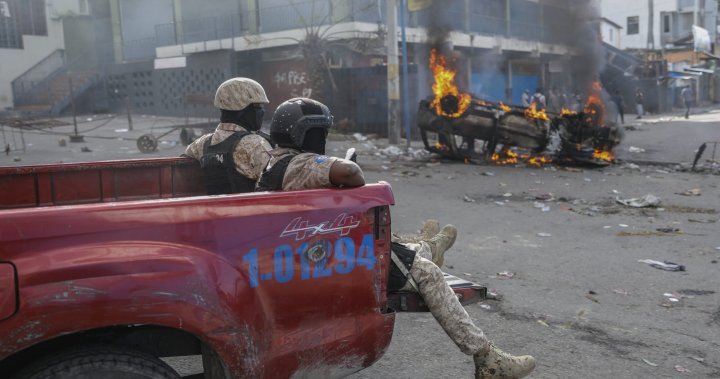A wave of panic swept through downtown Port-au-Prince on Thursday, with an outburst of violence marked by heavy gunfire and improvised barricades, and a gang leader took responsibility saying it was a demonstration against Haitian authorities.
The violent events took place on the same day Haiti’s Prime Minister Ariel Henry arrived in Kenya for talks on the deployment of a multinational security mission in the country backed by the United Nations.
By midday, most institutions and businesses in Port-au-Prince had closed and thousands of people commuted back home in public transit or walking to seek shelter, according to local witnesses.
Haitian airline Sunrise Airways halted flights as violence flared in Haiti, a company spokesperson said, adding shootouts near the capital’s airport had put people in danger.
Special police units were deployed throughout the city to respond to the violent events, a police spokesperson told a local radio station.
“We have chosen to take our destiny in our own hands. The battle we are waging will not only topple the Ariel (Henry) government. It is a battle that will change the whole system,” said former cop and gang leader Jimmy Cherizier, also known as Barbecue, in a video shared on social media.

Henry, who was sworn in as prime minister with the backing of the international community after the assassination of President Jovenel Moïse in 2021, had pledged to step down by early February but later said security must first be re-established in order to ensure free and fair elections.
Breaking news from Canada and around the world
sent to your email, as it happens.
The Caribbean Community (CARICOM) said in a statement late Thursday that Henry has committed to holding general elections by Aug. 31 next year, following a regional summit of Caribbean nations in Guyana. It is the third time he has announced such a deadline, with previous promises made in 2022 and 2023.
CARICOM said it would send an assessment team to evaluate electoral needs by March 31 of this year to support planning and establishment of the relevant institutions.
Gang violence has flared up in Haiti since Moïse’s assassination. The U.N. estimates the conflict killed close to 5,000 people last year and has driven some 300,000 from their homes.
Henry said he was traveling at the invitation of Kenyan President William Ruto to “finalize modalities” for agreements between the countries on the deployment, which would send 1,000 Kenyan police officers to Haiti.
Kenya agreed in October to lead a U.N.-authorized international police force to Haiti, but the Kenyan High Court in January ruled the plan unconstitutional in part because of a lack of “reciprocal agreements” between the two countries.
It was not immediately clear how, or if, the agreements could circumvent the court’s ruling, which also said that Kenya’s National Police Service cannot be deployed outside the country.

Ekuru Aukot, an opposition leader who has challenged the deployment in court, has said that even if the Kenyan government establishes an appropriate agreement with Haiti, its prime minister lacks the legitimacy to sign the document on behalf of the country.
The United Nations Security Council’s resolution requires countries to inform U.N. Secretary-General Antonio Guterres of their participation in the security mission. While approved by the Security Council, the mission is not a U.N. operation.
The Bahamas, Bangladesh, Barbados, Benin and Chad have formally notified the United Nations of their intent to contribute personnel to the international force, a U.N. spokesman said on Thursday.
Ruto has said the plan will go ahead with Kenya’s leadership despite the court ruling, however his government has not yet notified Guterres.
Contributions of $10.8 million have also been deposited into a trust fund to support the multinational security support mission, U.N. spokesman Stephane Dujarric told reporters, adding that further pledges of $78 million had also been made.
Global Affairs Canada said last week the government is committing $80.5 million toward the mission.
Separately, the United Nations said some 5.5 million people in Haiti – half the population – need humanitarian assistance and it is appealing for $674 million in 2024. Last year the U.N. only received a third of the money it requested, said U.N. Humanitarian Coordinator for Haiti Ulrika Richardson.
—With additional files from the Associated Press



